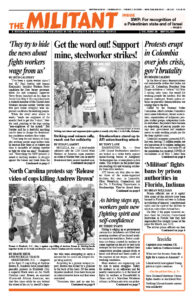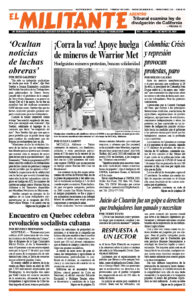Prison officials are at it again! Five issues of the Militant have been banned in Florida and two in Indiana in violation of inmates’ constitutional rights and the right of the Militant to reach its subscribers behind bars.
On May 3 the paper received notices from the Century Correctional Institution in Florida that they had impounded five straight issues of the paper for March, nos. 8-12.
The articles prison officials say they object to show their blatant bias against the Militant’s political point of view. Many offer solidarity with strike struggles and union-organizing efforts widely covered by the media nationwide.
Articles that particularly irked prison authorities report on the success that the Militant and Socialist Workers Party have had in getting contributions from readers’ government “stimulus” checks.
Articles from issue no. 8 deemed “inadmissible” are: “Page 5 — On the Picket Line; Page 4 — Victory! Pennsylvania Prison Ban on ‘Militant’ Reversed; Page 2 — Stimulus Fund for ‘Militant’ Climbs over $75,000.” And for this last one, the notice adds, “… inmate funds going to support socialism,” though there is no mention of this in the article.
All these articles, the rejection notice alleges, are “dangerously inflammatory in that it advocates or encourages riot, insurrection, rebellion, organized prison protest, disruption of the institution, or the violation of the federal law, state law, or Department rules” and “threatens physical harm, blackmail or extortion.”
Other articles that were banned are: “Amazon Workers Organize in Fight for a Union,” referring to the recent organizing drive by the Retail, Wholesale and Department Store Union in Bessemer, Alabama; “Manchester Bus Drivers Strike Against Attack on Hours, Pay;” and “Steelworkers at ATI Vote to Authorize Strike.”
Also listed for impoundment were articles with headlines that read, “Protest: ‘Indict the Police Who Killed Breonna Taylor Now!’” and “Volunteers Expand Pathfinder Bookstore Placements.” The latter reported that several prison librarians planned to make Pathfinder brochures available so prisoners can order literature by Socialist Workers Party leaders and other revolutionaries online.
“These bans are preposterously far-reaching and an outrageous attack on the constitutional rights to freedom of speech and of the press,” said Militant editor John Studer. “Workers behind bars have the same right as anyone else to read, study and form their own opinions about how to deal with today’s deepening economic, social and political crisis in the U.S. and worldwide.”
Militant attorney David Goldstein has informed the Florida Department of Corrections Literature Review Committee that unless it overturns these bans itself, he is preparing an appeal demanding they be reversed.
The Militant received a notice May 7 from Wabash Valley Correctional Facility in Carlisle, Indiana, that issue no. 18 had been confiscated from Militant subscriber Kevin “Rashid” Johnson.
Indiana prison bans
The reason given? “Images of guns” on page 12 “not allowed.” The offending photo, part of an article in Spanish about the Cuban Revolution, shows a celebration by Cuban militia members after their defeat of the U.S.-organized mercenary invasion at the Bay of Pigs in April 1961. A similar article appeared in the previous issue in English that a close friend of Johnson informed the Militant was also banned.
Johnson is a well-known political activist who has faced previous attempts by prison authorities to impound issues of the Militant and other publications. Last November the Militant won a victory reversing Indiana prison officials’ banning of one of his papers.
“With all the wars that have been fought, and been covered in photo spreads in the press — from Afghanistan to Iraq, Vietnam, Korea, and others of Washington’s wars for decades,” said Studer, “you’d have to ban just about every newspaper coming into the prison.
“The Militant will challenge all these impoundments, as it has with all previous ones, a fight that in most cases we’ve won,” Studer said.

